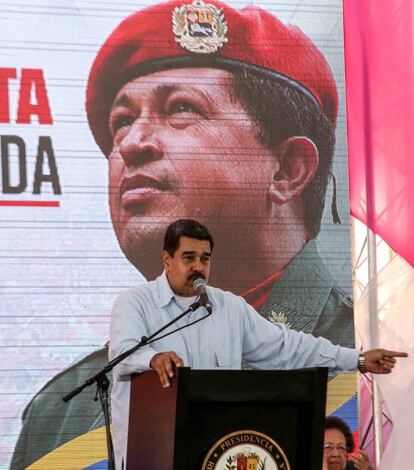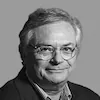Maduro doesn’t matter
He is simply the useful idiot, the puppet of those who really rule Venezuela

Nicolás Maduro should not remain president of Venezuela.
It’s hard to decide what his greatest flaw is. Which is more serious, the cruel indifference that he shows the millions of suffering Venezuelans or his brutal dictatorial behavior? Which is more outrageous, his immense ignorance or watching him dance on television while, in the streets, his henchmen murder defenseless young people? The list of failures is long, and Venezuelans know it; 90% of them oppose Maduro. And it's not just Venezuelans. The rest of the world has also discovered – at last! – his despotic, corrupt, and inept character.
And yet... Maduro doesn’t really matter. And removing him is not enough. He is simply the useful idiot, the puppet of those who really control Venezuela: the Cubans, the drug traffickers, and the widowers of Chavismo. And, of course, the military. Sadly, the armed forces have been co-opted and are at the service of the real owners of the country. Thus, we see daily how the men in uniform are willing to massacre their own people in order to keep Venezuela’s criminal oligarchy in power.
Cubans have exported their successful control strategies to Venezuela and the effects are obvious
The most important component of this oligarchy is the Cuban regime. Three years ago I wrote: “Venezuelan aid is indispensable to prevent the Cuban economy from collapsing. Having a government in Caracas that maintains such aid is a vital objective of the Cuban State. And Cuba has accumulated decades of experience, knowledge, and contacts that allow it to operate internationally with great efficacy and, when necessary, in a way that is almost invisible.” Obviously, the priority for Havana is to continue to control and plunder Venezuela. And they know how to do it. Cubans have perfected the techniques of the police state: constant but selective repression, the purchase of consciences through extortion and bribery, espionage, and persecution. But above all, the Cuban regime knows how to protect itself from a military coup. That is the main threat to any dictatorship and, therefore, to control the armed forces is an indispensable requirement for any self-respecting dictator. Cubans have exported their successful control strategies to Venezuela and the effects are obvious: the military leaders that do not sympathize with the Chávez/Maduro regime have been neutralized, while those who support it have gotten rich. It is no coincidence that in Venezuela there are more generals today than in NATO or the United States. Or that many high-ranking officials are exiled, imprisoned, or killed. That is why the hope that officers who are patriotic, democratic, and honest will defend the nation and not those who plunder it has so far been just that, a hope.
But, in addition, Cuba – in stumbling across Venezuela – happened upon one of the most unprecedented gifts in the annals of geopolitics: Hugo Chávez, the president of a petro state who happily invited a bankrupt dictatorship to control his country’s vital functions, everything from intelligence, elections, economics, and politics to, of course, military and citizen surveillance. There are few important decisions of the Venezuelan government that are not approved, molded, or stealthily ordered by the Cuban regime.
Or influenced by drug traffickers. They constitute the other great power that renders Maduro largely irrelevant. Today Venezuela is one of the main drug routes to the US and Europe. This means that there are billions of dollars at stake, and that the country operates a vast network of people and organizations that control the illicit trade and the enormous amount of money it generates. According to US officials, one such person is Vice President Tareck El Aissami, as well as a large number of military officers and other relatives and members of the ruling oligarchy.
It is essential to neutralize the three nefarious criminal cartels that really control Venezuela
This oligarchy, formed by Chávez's political heirs, is the third major component of the real power in Venezuela. Of course, Nicolás Maduro; his wife, Cilia Flores; and many of his relatives and associates are part of that oligarchy. In this elite there are different “families,” “cartels,” and groups that compete for political power, for influence in government decisions, and for political appointments, as well as for the control of illicit markets – ranging form the traffic of people to the smuggling of weapons or money laundering. The smuggling and selling of food, medicines and all kinds of products, as well as currency speculation, government bonds, and the finance and insurance business are just a few of the many other corrupt activities that enrich the Maduro oligarchy. And also the Cubans, the military and their civilian accomplices. The three groups are intermingled in business, corruption, and the exercise of power.
Getting rid of Maduro is necessary. But it's not enough. It is essential to neutralize the three nefarious criminal cartels that really control Venezuela. It will not be easy. But it is possible.
Follow me on Twitter @moisesnaim
Tu suscripción se está usando en otro dispositivo
¿Quieres añadir otro usuario a tu suscripción?
Si continúas leyendo en este dispositivo, no se podrá leer en el otro.
FlechaTu suscripción se está usando en otro dispositivo y solo puedes acceder a EL PAÍS desde un dispositivo a la vez.
Si quieres compartir tu cuenta, cambia tu suscripción a la modalidad Premium, así podrás añadir otro usuario. Cada uno accederá con su propia cuenta de email, lo que os permitirá personalizar vuestra experiencia en EL PAÍS.
¿Tienes una suscripción de empresa? Accede aquí para contratar más cuentas.
En el caso de no saber quién está usando tu cuenta, te recomendamos cambiar tu contraseña aquí.
Si decides continuar compartiendo tu cuenta, este mensaje se mostrará en tu dispositivo y en el de la otra persona que está usando tu cuenta de forma indefinida, afectando a tu experiencia de lectura. Puedes consultar aquí los términos y condiciones de la suscripción digital.









































